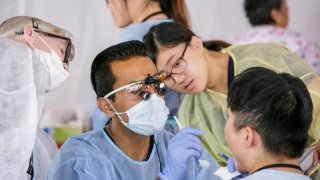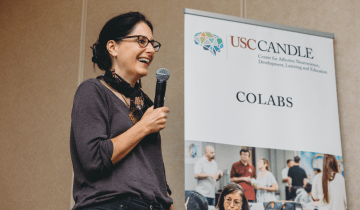As a part of a clinical trial for a promising eye treatment that could restore vision to those suffering from age-related macular degeneration, USC Rossier Associate Professor Kendrick Davis, in partnership with the USC Race and Equity Center and the USC Ginsburg Institute for Biomedical Therapeutics at Keck School of Medicine, will provide training and strategic advising to the clinical team. Davis will also lead a study on the effectiveness of DEI-informed approaches that will be used in the trial. The work will be funded by a $300,000 subgrant awarded by the California Institute for Regenerative Medicine. The subgrant is part of a larger $12.5 million grant to Regenerative Patch Technologies (RPT) for the continued study of RPT’s stem cell patch which has shown promise as a potential cure for blindness.
In July of 2023, CIRM awarded the grant to the USC-supported startup RPT as a part of a combined gift of support totaling 21 million. Additional funds were provided by The Marcus Foundation in Atlanta, which provided a $7-million peer-reviewed grant to USC researcher Mark Humayun, and USC Research and Innovation, which contributed a $2-million promissory note. Humayun, director of the USC Ginsburg Institute for Biomedical Therapeutics and co-director of the USC Gayle and Edward Roski Eye Institute, co-founded RPT with Dennis Clegg, UC Santa Barbara professor, and the late David Hinton, professor of pathology and pathology at USC.
This announcement comes during Healthy Vision Month, which shines a light on vision loss and mental health—and shares steps that people with a visual impairment can take to thrive in their daily lives.
Over the four-year project, professional learning courses will be offered to surgeons and staff working on the trial to equip them with the tools to better engage and communicate with communities of color, the underinsured, not insured and rural communities in years one and two. The team will provide courses on engagement with marginalized communities, biases in clinical trials and advocating for equity in medicine.
In addition to the courses, the Center will provide strategic advising to the project, including on recruiting diverse participants by using DEI-informed messaging in the early stages of the initiative. The team, which includes Davis’ colleagues at the USC Race and Equity Center, LaNita Gregory Campbell, Wilmon A. Christian III, Brandi Junious and AJ Mada, aims to assist the clinical team in understanding the historical trauma communities of color have experienced when participating in medical trials.
The ramifications of trials like the devastating Tuskegee experiment in which Black male participants were told they were receiving treatment for syphilis, when in reality the clinical team was studying the effects of syphilis has had lasting impact on communities of color and has fueled their distrust for medical trials. On average, just 5% of participants in clinical trials are Black who make up around 14% of the US population and less than 8% of participants identify as Hispanic who make up around 19% of the US population.
According to Davis, “the team will provide advisement on ways to ensure those communities are aware of whether they have the disease, how to participate in the trials, the measures taken to ensure they are safe from physical and psychological harm and how to correct for broken trust between these communities and medical practices that have historically harmed or excluded them. We will ensure diversity, equity and inclusion are at the core of all aspects of these trials.”
As the team is training clinical staff and offering strategic advisement, Davis will investigate the effectiveness of the trial’s DEI-informed approaches with a goal of developing best practices for those in the medical field as they engage with diverse communities in the future. Demographic and qualitative data from participants, clinical coordinators and surgeons will be collected and analyzed to answer research questions about the extent to which DEI training positively impacts clinical practices, and the ways in which more culturally responsive outreach contributes to building trust and reimagining relationships.
Davis emphasized, “Clinical trials are a vital vehicle for advancing healthcare equity. They not only provide essential data for developing new treatments but also offer a unique opportunity to build trust and improve health outcomes in communities that have been historically marginalized.”





